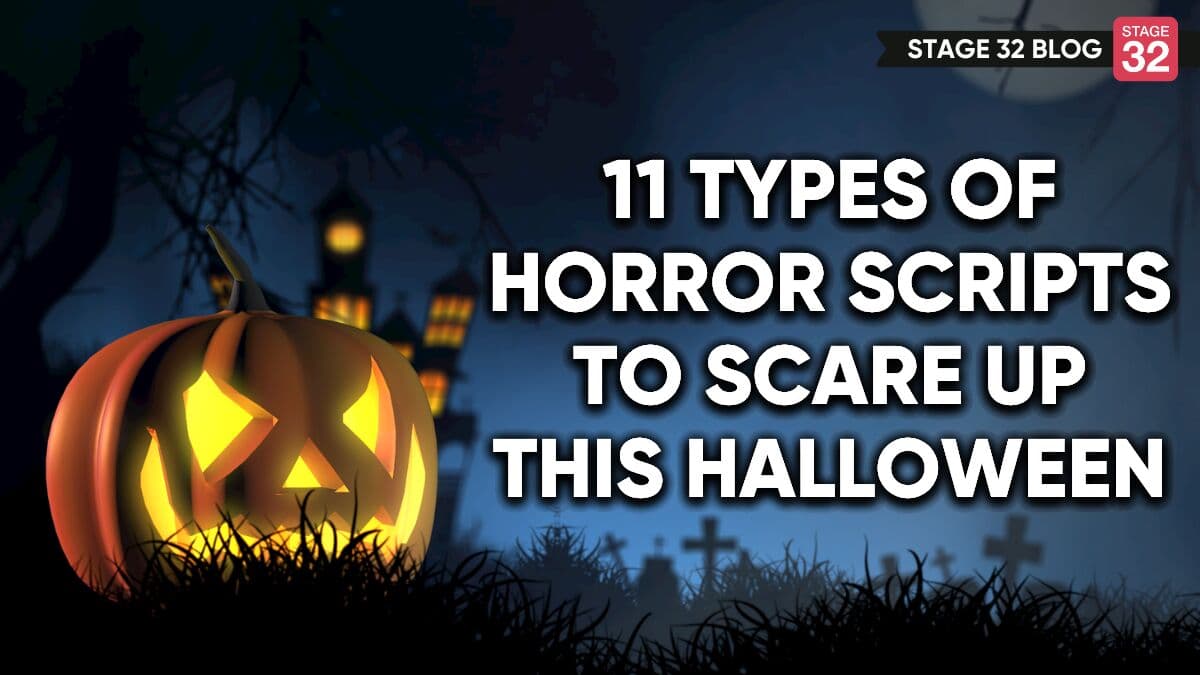11 Types of Horror Scripts to Scare Up This Halloween

11 Types of Horror Scripts to Scare Up This Halloween

Horror is debatably one of if not the most misunderstood genres in film and television. Outside of "beloved" intellectual properties, it arguably has one of the most hardcore, savvy, and devoted audiences, but… what quantifies a proper Horror film? Tropes? Jump scares? Demonic creatures? Monsters? A psycho with a machete? How about all of the above? Let's dive in and break down a few subgenres highlighting the best and most diverse stories that will leave your minds twisted and your skin crawling.
Grounded
The core concept of a grounded script falls into the territory of "is it plausible, believable." This brings to mind classic horror films like Alfred Hitchcock's Psycho, which follows a simple concept. An extremely disturbed "psychotic" man with a taste for murder. Norman Bates isn't some demon-possessed, invincible, supernatural creature. He's just a man with some serious mental issues. You could make the case that it falls into the sub-categories of psychological or thriller, and you wouldn't be wrong. That's the trick, as subgenres often overlap. Think about John Carpenter's Halloween or the original Friday the 13th. In their debut, before becoming the massive franchises that we know today, these films were quite simple. A disturbed child who grows up to become a serial killer or a mother seeking revenge against the hyper-sexualized, morally deprived teens vicariously responsible for her son's death, which; takes us to our next sub-genre.
Slasher
The slasher genre is perhaps the most popular, or at the very least, most recognizable, particularly with your casual horror fan. While films like Psycho technically fall into the category, the aforementioned films of Halloween and Friday the 13th are globally the most notorious and recognizable slashers. The industry still cranking out sequels as recently as a week ago with Halloween Ends, but what quantifies an excellent old fashion slasher? BODY COUNT! The contrast between the classic Psycho, which has only one on-screen death, and the contemporary slasher, which carries an expectation of high kills and wouldn't be a true slasher with the quintessential "Final Girl." The sole survivor who, against all odds and injuries, makes it to the end of the film defeating their slow stalking foes, but before Laurie Strode survived several attacks over a series of films, there was Sally Hardesty from 1974's Texas Chainsaw Massacre, introducing horror fans to perhaps one of the most iconic horror screen villains, Leather Face, and his cannibalistic family, which; brings us to our next subgenre. The semi-biographical or…

Based on a True Story
1974's Texas Chainsaw Massacre famously opens with the narration, "The film which you are about to see is an account of the tragedy which befell a group of five youths, particularly Sally Hardesty and her invalid brother, Franklin." While we all know that filmmakers like to play loose with the term "based on a true story," the film, in many ways, is faithful to its inspiration. The killings and strange behavior of serial killer Ed Gein, who's had more than his fair share of cinematic adaptations. Then there's the 1986 Michael Rooker-led film "Henry, Portrait of a Serial Killer, loosely based on the murder spree of Henry Lee Lucas, one of the most notorious serial killers in criminal history claiming responsibility for over 3000 murders, although; this number was ultimately concluded to be highly inflated, but Henry is just one of many. Our culture seems obsessed with these true-life monsters, almost all of whom have films highlighting their exploits at one point or another, from Bundy, Manson, Gacy, and as recently as Netflix's newest, controversial horror biography, Dahmer – Monster: The Jeffery Dahmer Story.
The Supernatural/Biblical
In 1973 writer William Peter Blatty penned the screenplay for The Exorcist. Nearly forty years later, it's still considered one of the most terrifying horror movies ever shown on the silver screen, as it plunges the audience into the surreal. An other-worldly creature from the depths of Hell, taking possession, quite literally, of a young girl and torturing her and anyone who came to her aid. To the faithful and God-fearing, this film could easily be seen as grounded, yet another example of blended subgenres. Creatures from the afterlife wreaking havoc from the beyond. M. Night Shyamalan's 1999 directorial debut, The Sixth Sense, became an instant classic with a twist that has yet to be matched. The story of a young boy who sees and communicates with "dead people," aka ghosts. A game changer that took audiences on a cryptic, "supernatural" psychological journey setting the stage for future films with similar premises like the Nichole Kidman-led ghost story The Others and, more recently, the Netflix original His House. A foreign film that cleverly interweaves race, culture, and immigration into a frightening tale of guilt.
Sci-Fi
"In space, no one can hear you scream." Ridley Scott flipped the final girl trope on its head, introducing audiences to the strong, intelligent, capable female protagonist Ellen Ripley in the 1979 space horror odyssey Alien. No longer a lucky, trip-happy scream queen. A genre-changing masterpiece that was far ahead of its time, opening the door for predecessors like its sequel Aliens, space/action/horror, and others like the Vin Diesel-led Pitch Black or Event Horizon, a futuristic space crusade about a blackhole to Hell and a personal favorite, the grounded, futuristic Schwarzenegger driven action/horror film, 1987's Predator.

Psychological
Jordan Peele broke the genre with his 2018 release, Get Out. His antagonists quite literally break into the mind of protagonist Chis Washington. Yet, in the wake of BLM, social justice warriors, and off the heels of America's first President of color, Peele also intelligently probes into the philosophical, socially conscious territory of political and racial themes with tensions at an all-time high in contemporary American society. Similarly, 1990's Jacob's Ladder takes the audience on a cryptically creepy journey posing questions relative to the time and space between life and death. Two parallel inter-connected consciousnesses against the harsh backdrop of the Vietnam War and the gritty street life of New York City.
Thriller/Suspense
Before Mike Flanaghan was blowing minds with his Netflix series, The Haunting of Hill House, The Haunting of Bly Manor, and Black Mass, he pinned a horrific gem with 2017's Gerald's Game, based on a novel by Stephen King, possibly the greatest horror writer of all time. Another blended genre, Gerald's Game, creates a terrifying, grounded, psychological scenario of self-preservation. There are no creatures, no invading forces from another world, just a tale of survival. Man… Well, woman vs. a volatile but believable predicament of life vs. death. With over 65 novels to his resume, King has one of the most adapted, genre-blending horror catalogs, including classic hits like Misery, Carrie, IT, Needful Things, and The Mist.
High Concept/Elevated
With the emergence of distribution companies like A24 and streaming services, Elevated or High Concept Horror is the latest trend in a long line of disturbing narratives, with filmmakers like Ari Aster, David Lowery, and Darren Aronofsky inspiring a whole new generation of warped minds. If you asked writer and director Ari Aster if he considered his 2019 hit Midsommar to be a horror film, his answer would be no, "You always want to write a breakup movie when you're in a breakup…" and at its core, that's precisely what it is. A breakup movie. In other films, such as the stylized 2017 Greek adaptation, The Killing of A Sacred Deer, or 2017's The Ritual, the subgenre of high concept exists in the realm of theme above all.

Comedic/Satire
I remember driving to the video store as a teenager, constantly tempted by a poster of a menacing skull creature with human eyes. Finally, I gave in and rented Sam Raimi's Evil Dead II, and my life was changed forever. What starts as a fairly traditional horror movie quickly evolves into a campy, over-the-top action work of genius. Another master of fright, Wes Craven, changed the game with his 1996 meta-horror satire Scream. A combination of both the Grounded and Slasher genres. And then there's Edgar Wright. His 2004 big screen debut with the comedic cult-classic Shaun of the Dead, lampooning the monotony of the day-to-day grind using zombies as the perfect metaphor.
Z is for Zombie, MONSTERS!
Werewolves, Vampires, and Zombies… OH MY! That's right, monsters. Perhaps saving the best for last, creatures have been haunting our dreams, inspiring writers like Mary Shelley to write her novel Frankenstein as far back as 1818. Inspiring screen adaptations since the invention of film. In the early 2000s, the Zombie/Monster genre saw a prolific resurgence, thanks partly to Zack Snyder's frantic 2002 remake, Dawn of the Dead, but it all started back in 1968 with George R. Romero's Night of Living Dead. At the height of the Civil Rights movement, Romero's film features an African American lead with an underlying political charge, inspiring today's trendsetters like Peele.
In Memoriam
So, what's the big takeaway? The message? Well… We're just scratching the surface here. You could write a book about these 10 subgenres. In fact, someone has with the book Horror Films by Subgenre by Chris Vander Kaay & Kathleen Fernandez-Vander Kaay, not to mention the ones I left out, but with overlap and good writing, there's always a fair amount of everything. What's important? It's not screams. Like all impactful storytelling, it's about evoking an emotional response, tapping into something, and connecting with your audience. If they happen to leave the theater shaking in their boots? I guess that's okay too!
In the "spirit" of Halloween, here's a short list of my all-time favorite must-watch… if you have the courage.
- Attack the Block
- The Crow
- Three… Extremes
- Psycho Goreman
- Train to Busan
- Arachnophobia
- Monster Squad
- Insidious
- Mandy
- Triangle
Let's hear your thoughts in the comments below!
Got an idea for a post? Or have you collaborated with Stage 32 members to create a project? We'd love to hear about it. Email Ashley at blog@stage32.com and let's get your post published!
Please help support your fellow Stage 32ers by sharing this on social. Check out the social media buttons at the top to share on Instagram @stage32 , Twitter @stage32 , Facebook @stage32 , and LinkedIn @stage-32 .
About the Author

Dustin Quinteros
Director, Editor, Filmmaker, Screenwriter, Producer




